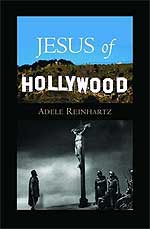There is a meme going around on Top Three Bible Films started by Matt over at Broadcast Depth (I noticed it over at Mike Kok’s blog, The Golden Rule). I figured since I am lecturing this week on Religious films in my religion and culture class, I would weigh-in with my personal favourites — although limiting it to three is tough.
1. One of my favourite films based on the Hebrew Bible/Old Testament is an oldie, but a goodie: The Green Pastures (Director: Marc Connelly and William Keighley, 1936; Buy from Amazon.ca: VHS or DVD | Buy from Amazon.com: VHS or DVD). This is a fascinating retelling of a number of stories from the Old Testament. This folksy film was innovative for its day in that black actors fill every role — from God to Moses, Noah to Pharaoh. (Fair warning that some may be uncomfortable with some of the racial stereotypes in the film; is was made in 1936 after all). Any film that includes a heavenly fish fry where “de Lawd” walks about drinking “fire-custard” and smoking 10-cent cigars and singing gospel songs is pretty cool in my books!
2. My favourite “Jesus film” is not quite as old, but is still black and white: Son of Man (Director: Gareth Davies, 1969. This film was aired on BBC as part of the Wednesday Play series in 1969. Unfortunately, it is not available for purchase (I got my copy from a friend who recorded it when it was rebroadcast on TV), although you can see some clips of it on the BFI website. The highlight of the film for me is Colin Blakely’s portrayal of a gruff and passionate Jesus — definitely not your typical blue-eyed blond Jesus of most hagiopics. The other Jesus film that comes in a close second for me is The Gospel According to St. Matthew (Il Vangelo secondo Matteo; Pier Pablo Passolini, 1964; Buy from Amazon.ca or Amazon.com).
3. Finally, for “something completely different,” my third pick is Monty Python’s Life of Brian (Terry Jones, 1979; IMDb; Buy from Amazon.ca or Amazon.com). While technically not a “Jesus film” (it is about Brian, not Jesus), this affectionate parody is a classic. If we can’t laugh at ourselves, then something is wrong. Eric Idle himself is reported as saying, “If anything can survive the probe of humour it is clearly of value, and conversely all groups who claim immunity from laughter are claiming special privileges which should not be granted.” But this film is not all laughs — it actually presents aspects of the time of Jesus somewhat accurately, such as the ubiquitous messiahs and prophets during that period as well as the sheer diversity with Judaism at that time.
I could go on and on, but I will end it here. If you are interested in more films based on the Bible, check out my “The Old Testament on Film” pages.

 I just received my copy of Adele Reinhartz’s new book,
I just received my copy of Adele Reinhartz’s new book,  The first section ends with a chapter dealing with the thorny issue of the relationship of Jesus films — and the gospels they are ostensibly based on — to history. Here Reinhartz’s background as a biblical scholar comes to the fore. While many filmmakers have claimed to present the “reel” Jesus in their films, i.e., a Jesus who is faithful to both the Scriptures and history, Reinhartz questions these claims. She deals deftly with the complicated question of the relationship of the gospels to history and how screenwriters have negotiated between the divergent portrayals of Jesus in the four gospels., focusing on the iconoclastic films
The first section ends with a chapter dealing with the thorny issue of the relationship of Jesus films — and the gospels they are ostensibly based on — to history. Here Reinhartz’s background as a biblical scholar comes to the fore. While many filmmakers have claimed to present the “reel” Jesus in their films, i.e., a Jesus who is faithful to both the Scriptures and history, Reinhartz questions these claims. She deals deftly with the complicated question of the relationship of the gospels to history and how screenwriters have negotiated between the divergent portrayals of Jesus in the four gospels., focusing on the iconoclastic films 